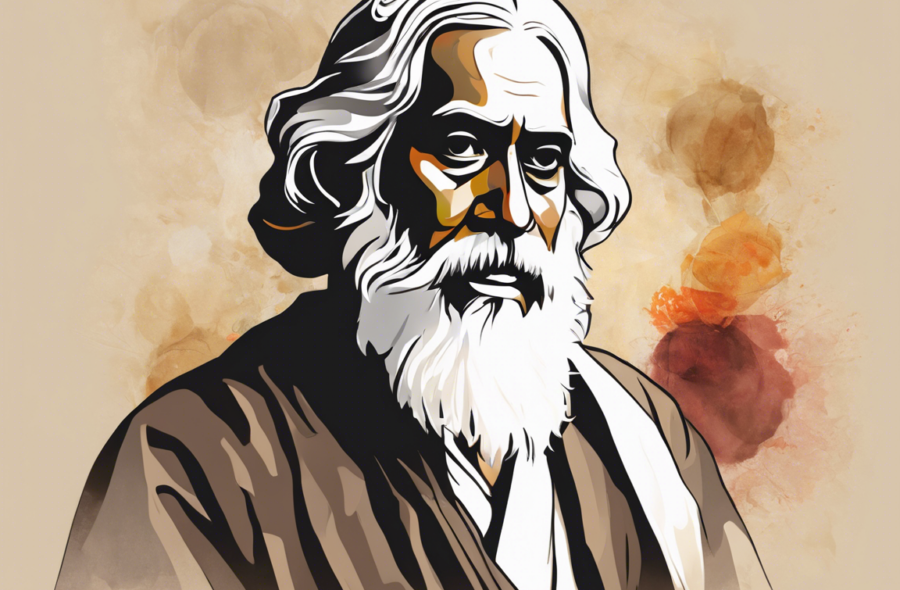Rabindranath Tagore, a polymath, literary giant, and pioneer of the Indian Renaissance, is celebrated annually on his birthday, Rabindranath Tagore Jayanti, marking a day to honor his contributions to literature, art, and culture. Tagore, the first non-European Nobel laureate in Literature, wrote poetry, music, and essays in Bengali and English that continue to inspire and resonate with readers worldwide.
Early Life and Influences
Rabindranath Tagore was born on May 7, 1861, in Calcutta, Bengal Presidency, British India, into a distinguished Bengali family. He was the youngest of thirteen children and grew up in a culturally rich environment that influenced his later works. Tagore was educated at home and went on to study law in London, but his true calling was literature and the arts. His formative years were shaped by the teachings of his father, Debendranath Tagore, a prominent philosopher, and religious reformer.
Literary Contributions
Tagore’s literary legacy is vast and diverse, encompassing poetry, music, short stories, novels, essays, and plays. His poetic works, including the iconic “Gitanjali” (Song Offerings), earned him the Nobel Prize in Literature in 1913 and brought international recognition to Indian literature. Tagore’s writing reflected universal themes of love, nature, spirituality, and humanism, drawing from his deep-rooted connection to his homeland.
Artistic Achievements
In addition to his literary pursuits, Rabindranath Tagore was a prolific painter whose works embodied his poetic vision and spiritual insights. He was also a composer and musician who created thousands of songs, known as Rabindra Sangeet, blending Indian classical and folk melodies with his own poetic lyrics. Tagore’s artistic creativity knew no bounds, and his multidisciplinary approach continues to inspire artists, writers, and musicians across the globe.
Philosophy and Ideals
Tagore’s philosophy emphasized the interconnectedness of humanity and the harmonious coexistence of diverse cultures and traditions. He believed in the power of education, creativity, and dialogue to bridge divides and foster understanding among nations. Tagore’s ideals of freedom, empathy, and social justice remain relevant in today’s world, calling for a more inclusive and compassionate society.
Legacy and Influence
Rabindranath Tagore’s impact transcends borders and generations, leaving an indelible mark on world literature and culture. His works have been translated into numerous languages and continue to be studied, performed, and celebrated globally. Tagore’s ideals of universalism, humanism, and artistic expression resonate with audiences worldwide, carrying forward his message of peace, harmony, and enlightenment.
Celebrating Rabindranath Tagore Jayanti
On Rabindranath Tagore Jayanti, admirers and enthusiasts come together to pay tribute to the literary legend through readings, music recitals, art exhibitions, and cultural events. Schools, colleges, and cultural institutions organize special programs to commemorate Tagore’s legacy and introduce new audiences to his timeless works. The day serves as a reminder of Tagore’s enduring influence and the timeless relevance of his artistic vision.
FAQs about Rabindranath Tagore
- What is Rabindranath Tagore famous for?
Rabindranath Tagore is famous for his contributions to literature, music, art, and philosophy. He was the first non-European to win the Nobel Prize in Literature and is regarded as one of the greatest poets of all time.
- Why is Rabindranath Tagore’s work significant?
Tagore’s work is significant for its universal themes, lyrical beauty, and profound insights into human nature and spirituality. His writings continue to inspire and resonate with readers across cultures.
- What is Rabindra Sangeet?
Rabindra Sangeet refers to the songs composed by Rabindranath Tagore, which are an integral part of Bengali cultural heritage. These songs blend poetry, music, and emotion, reflecting Tagore’s poetic genius.
- How did Rabindranath Tagore contribute to Indian literature and culture?
Tagore played a pivotal role in revitalizing Indian literature and culture through his innovative works in poetry, music, and art. He promoted a sense of national identity and cultural pride through his creative endeavors.
- What is the significance of Rabindranath Tagore Jayanti?
Rabindranath Tagore Jayanti is celebrated to honor the birth anniversary of the literary legend and commemorate his enduring legacy. The day is marked by cultural events, readings, and performances dedicated to Tagore’s life and works.
In conclusion, Rabindranath Tagore’s enduring legacy as a literary genius, artist, and visionary continues to inspire and captivate audiences worldwide. His timeless works embody the essence of human experience, spirituality, and creativity, leaving behind a rich tapestry of literature and art for future generations to cherish and celebrate. On Rabindranath Tagore Jayanti, we pay tribute to this extraordinary soul who touched the hearts and minds of people across cultures and generations, reminding us of the enduring power of creativity, compassion, and enlightenment.

